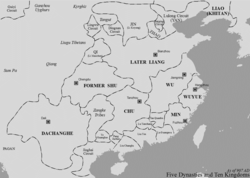Dachanghe
Dachanghe 大長和 | |||||||||
|---|---|---|---|---|---|---|---|---|---|
| 902–928 | |||||||||
 Map showing the location of Dachanghe | |||||||||
| Capital | Yangjumie (present day Dali) | ||||||||
| Religion | Buddhism | ||||||||
| Government | Monarchy | ||||||||
| History | |||||||||
• Established | 902 | ||||||||
• Overthrown | 928 | ||||||||
| |||||||||
| Today part of | China Laos Myanmar Vietnam | ||||||||
Dachanghe (Chinese: 大長和; lit. 'Great Long Harmony'), possibly Da Changhe or Changhe, was a monarchy from 902 to 928 in modern Yunnan, China. Founded by Zheng Maisi (鄭買嗣), it was the successor state of Nanzhao (738–902), whose ruling Meng (蒙) family was mass-murdered in a bloody coup by Zheng. The Zheng family suffered a similar fate 26 years later at the hands of Yang Ganzhen (楊干貞), who helped found a state named Datianxing (大天興) (928–929).
Zheng Maisi changed his name to Zheng Anguo and declared the reign era Anguo. His successor, Zheng Renmin, attacked Former Shu in 914 but suffered a heavy defeat. Renmin sent his grand councillor (buxie), Duan Yizong, to Former Shu, possibly to secure a marriage alliance. In 925, another mission led by the buxie Zheng Zhaochun secured a marriage alliance with Southern Han, whose ruler gave his daughter, the Zengcheng Princess, as wife. In 927, Later Tang defeated Former Shu and returned thousands of captives to Dachanghe.[1]
Rulers
[edit]- Zheng Maisi (鄭買嗣) 903-909
- Zheng Renmin (鄭仁旻) 910-926
- Zheng Longdan (鄭隆亶) 926-927
References
[edit]- Bryson, Megan (2019), The Great Kingdom of Eternal Peace: Buddhist Kingship in Tenth-Century Dali
- Wang, Hongjie (2011). Power and Politics in Tenth-Century China: The Former Shu Regime. Cambria Press. ISBN 978-1-60497-764-6.
- Theobald, Ulrich. "Chinese History - Dali 大理". Chinaknowledge. Archived from the original on 2016-03-04. Retrieved 2014-10-15.
- ^ Bryson 2019, p. 94-96.
- History of Yunnan
- Former countries in Chinese history
- 902 establishments
- 10th-century establishments in China
- 928 disestablishments
- 10th-century disestablishments in China
- Former monarchies of East Asia
- States and territories established in the 900s
- States and territories disestablished in the 10th century
- Chinese history stubs
